Research Data Management
Publications
-
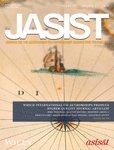
An Empirical Examination of Data Reuser Trust in a Digital Repository
24 June 2024
Elizabeth Yakel, Ixchel M. Faniel, Lionel P. Robert Jr
Proposes and tests a model of trust in a data repository and the influence that trust has on users’ decision-making.
-
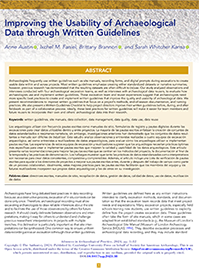
Improving the Usability of Archaeological Data through Written Guidelines
25 January 2024
Anne Austin, Ixchel M. Faniel, Brittany Brannon, and Sarah Whitcher Kansa
Our study analyzed observations and interviews conducted with four archaeological excavation teams, as well as interviews with archaeological data reusers, to evaluate how archaeologists use and implement written guidelines.
-
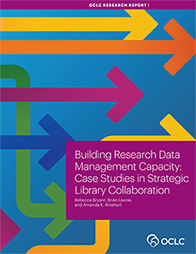
Building Research Data Management Capacity: Case Studies in Strategic Library Collaboration
11 December 2023
Rebecca Bryant, Brian Lavoie, Amanda K. Rinehart
Provides recommendations about collaborating to acquire RDM capacity based on three case studies of existing partnerships that empower libraries to build successful and sustainable collaborations.
Blog posts
Let’s cook up some metadata consistency 21 November 2019
Increase data reusability and enhance your curation investments with these three tips 7 August 2019
RDM: A challenge too big to tackle alone 14 February 2019
RLP Research Data Management Interest Group: Acquiring RDM Services for Your Institution 6 February 2019
RLP Research Data Management Interest Group: Identifying and Acting on Incentives When Planning RDM Services 11 December 2018
RLP Research Data Management Interest Group: Understanding Institutional RDM Services 1 November 2018
Preserving Research Data: Are you ready for a long-term commitment? 13 December 2018
Libraries and RDM: Three decisions, three components, three realities 24 May 2018
Mini-symposium on RDM in Leiden 9 May 2018
Use OCLC Research to Examine the Realities of Research Data Management at Your Institution 7 November 2017
On librarians and RDM 5 June 2017
Bringing order to the chaos of digital data 15 March 2017
Case studies in RDM capacity acquisition: A new project 20 October 2016
Metadata for research data management 18 April 2016
Data Management and Curation in 21st Century Archives – Part 2 29 September 2015
Data Management and Curation in 21st Century Archives – Part 1 1 September 2015
Events
Video: Hot Topic - Research Data Management by Ixchel M. Faniel 11 April 2019
Works in Progress Webinar: Sourcing RDM services: do you build or buy? 4 December 2018
Works in Progress Webinar: Works in Progress Webinar: Identifying and Acting on Incentives when Planning RDM Services 13 November 2018
Presentations
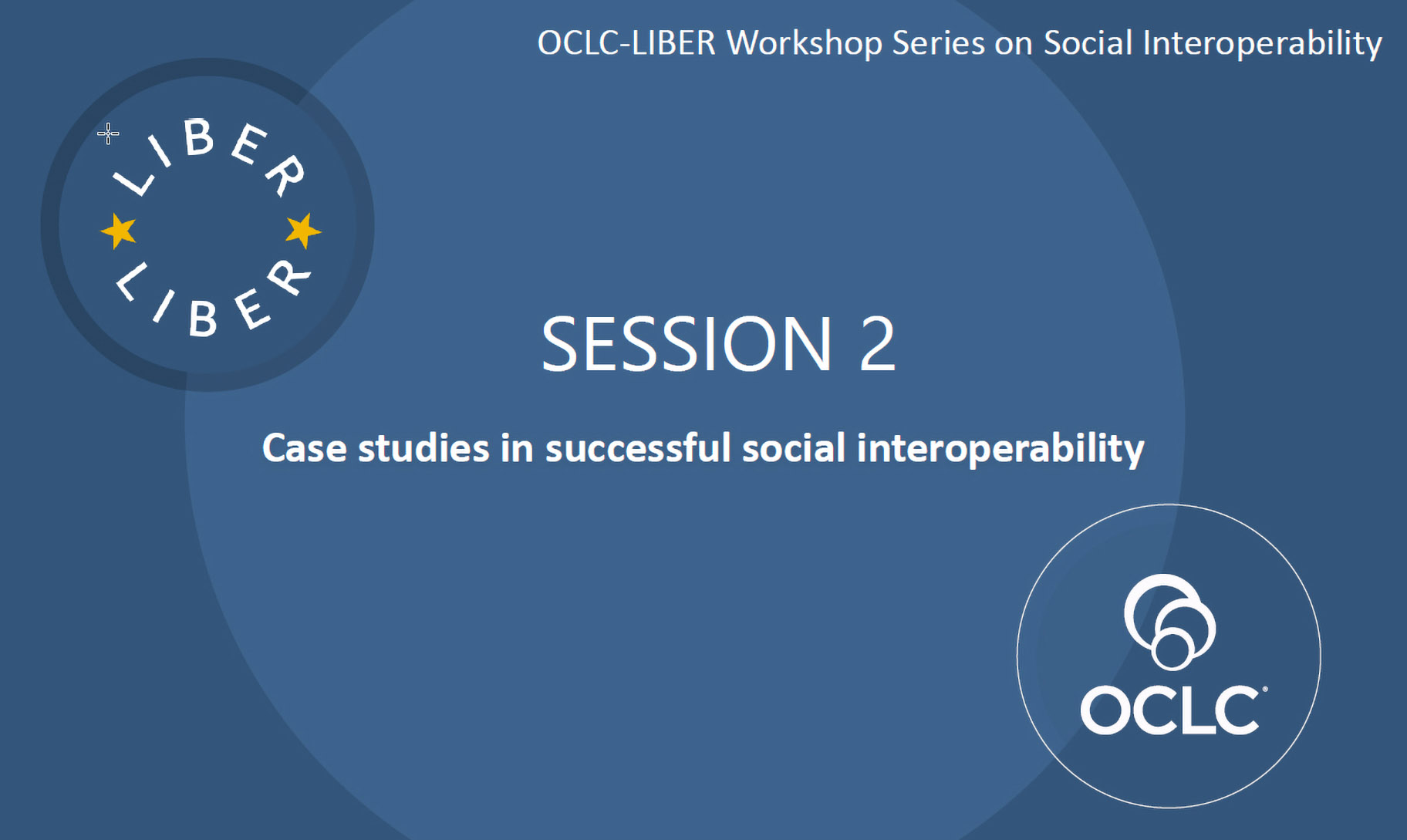
Social Interoperability Workshop 2: Case Studies in Successful Social Interoperability
virtual
Successful advancement of open scholarship initiatives at research universities worldwide is dependent upon collaboration and partnership among many stakeholders from across the institution. The recent OCLC Research Report, Social Interoperability in Research Support: Cross-Campus Partnerships and the University Research Enterprise, emphasizes that the best chance for developing these relationships is to cultivate a deep understanding of potential stakeholders: their responsibilities, pain points, and areas of common interest where engagement can take root and flourish.
However, in the recent OCLC-LIBER Open Science Discussion Series, many librarians reported feeling inadequately equipped to connect with the array of non-library stakeholders essential for open science success, despite the widespread acknowledgement that “open science must be a collective effort.” One participant even stated, “It’s making the connection that is most important…because we don’t know what they need.” A key takeaway from that discussion series was that library practitioners must develop a specific type of soft skill: the ability to create and maintain working relationships between individuals and organizational units that promote collaboration, communication, and mutual understanding. We call this skill “social interoperability.”
In May 2021, OCLC and LIBER are again collaborating to offer a three-session workshop series exclusively for LIBER members and OCLC Research Library Partnership Affiliates, using both the Social Interoperability in Research Support report and the key takeaways from the OCLC-LIBER Open Science Discussion Series, as a core component of the workshop curriculum. This workshop series is a pilot effort and participation numbers are strictly limited. Our organizations will be working together to assess the pilot and explore if this training exercise can be scaled to support more librarians.
WORKSHOP 2
The second workshop examines strategies and tactics that can support successful social interoperability. Participants discuss several case studies that exemplify successful cross-institutional collaboration in support of open scholarship in order to develop a shared understanding of both the ‘what’ and ‘how’ of relationship development/management.
Resources:
- Social Interoperability in Research Support, pages 16-35
- Case studies from different national environments:
- “The Big Ask”: Securing Recurring Campus Funding for a Research Data Service at the University of Illinois
- Emerging Roles for Libraries in Bibliometric and Research Impact Analysis: Lessons Learned from the University of Waterloo
- Zeeland, Hilde Van, and Jacquelijn Ringersma. 2017. “The Development of a Research Data Policy at Wageningen University & Research: Best Practices as a Framework.” LIBER Quarterly 27 (1): 153–70. https://doi.org/10.18352/lq.10215.
Topics: Research Data Management, Research Support, Research Information Management

Social Interoperability Workshop 1: Understanding Social and Structural Norms That Shape Academic Institutional Collaboration
virtual
Successful advancement of open scholarship initiatives at research universities worldwide is dependent upon collaboration and partnership among many stakeholders from across the institution. The recent OCLC Research Report, Social Interoperability in Research Support: Cross-Campus Partnerships and the University Research Enterprise, emphasizes that the best chance for developing these relationships is to cultivate a deep understanding of potential stakeholders: their responsibilities, pain points, and areas of common interest where engagement can take root and flourish.
However, in the recent OCLC-LIBER Open Science Discussion Series, many librarians reported feeling inadequately equipped to connect with the array of non-library stakeholders essential for open science success, despite the widespread acknowledgement that “open science must be a collective effort.” One participant even stated, “It’s making the connection that is most important…because we don’t know what they need.” A key takeaway from that discussion series was that library practitioners must develop a specific type of soft skill: the ability to create and maintain working relationships between individuals and organizational units that promote collaboration, communication, and mutual understanding. We call this skill “social interoperability.”
In May 2021, OCLC and LIBER are again collaborating to offer a three-session workshop series exclusively for LIBER members and OCLC Research Library Partnership Affiliates, using both the Social Interoperability in Research Support report and the key takeaways from the OCLC-LIBER Open Science Discussion Series, as a core component of the workshop curriculum. This workshop series is a pilot effort and participation numbers are strictly limited. Our organizations will be working together to assess the pilot and explore if this training exercise can be scaled to support more librarians.
WORKSHOP 1
The first workshop explores the social and structural norms that shape academic institutional collaboration, particularly examining the model of universities as “complex, adaptive systems.” It also introduces participants to key institutional stakeholders in research support. Participants engage in small group discussions about the challenges and barriers to collaboration at their institutions and begin work to create a mapping of their institutional structures.
Resources:
- Social Interoperability in Research Support, pages 1-15
- Session 1 Handout: Understanding social and structural norms that shape academic institutional collaboration.
Topics: Research Data Management, Research Support, Research Information Management
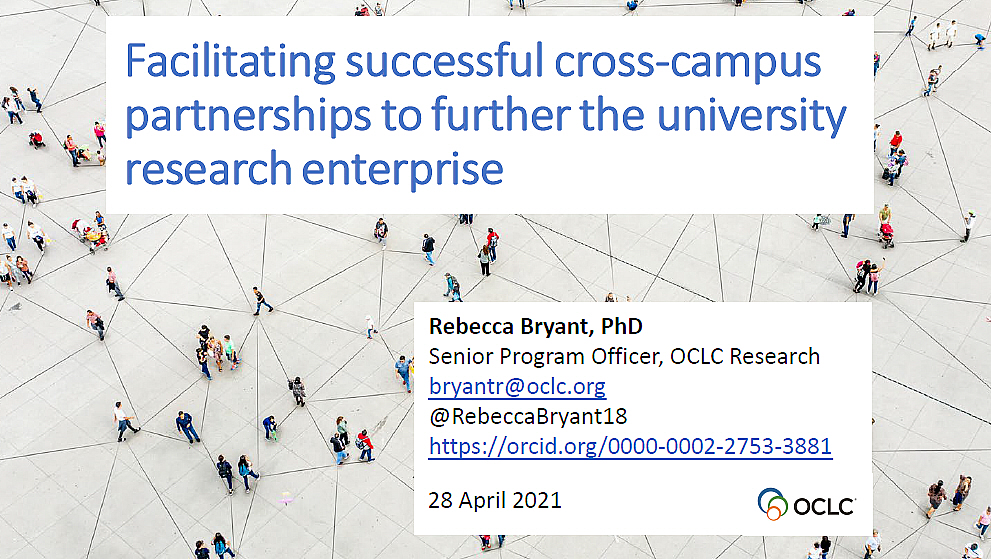
Facilitating Successful Cross-Campus Partnerships to Further the University Research Enterprise
virtual
This presentation provides an introduction to the recent OCLC Research report, Social Interoperability in Research Support: Cross-Campus Partnerships and The University Research Enterprise. Bryant explains why this collaboration is important, who the stakeholders would be, identifies the categories of support-services this collaboration will likely surface, and provides strategies and practical advice about cross-campus relationship-building in research support.
Topics: Research Information Management, Research Support, Research Data Management
Team Members
Rebecca Bryant, Senior Program Officer
Ixchel Faniel, Senior Research Scientist
Brian Lavoie, Senior Research Scientist
Planning Guide
A three-part set of resources, which includes webinars and guides, to support planning and decision making at institutions considering and developing RDM services. View the Planning Guide.